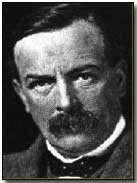Primary Documents - David Lloyd George's Opening Address at the Paris Peace Conference, 18 January 1919
 With Germany's decision to
seek an
armistice - or face domestic as well as military collapse -
arrangements were set in place to convene a peace conference in Paris; the city was unanimously selected by the Allied powers.
With Germany's decision to
seek an
armistice - or face domestic as well as military collapse -
arrangements were set in place to convene a peace conference in Paris; the city was unanimously selected by the Allied powers.
The conference began somewhat belatedly in mid-January with opening addresses from many of the key Allies.
Reproduced below is British Prime Minister David Lloyd George's opening address.
Click here to read the welcoming address given to delegates by French President Raymond Poincare; click here to read the opening address by U.S. President Woodrow Wilson; click here to read Italian Prime Minister Sidney Sonnino's address; click here to read French Prime Minister Georges Clemenceau's address. Click here to read an account of the run up to the opening session by the official British observer Sisley Huddleston.
Click here to read the German delegation's protest against the final Allied peace terms. Click here to read the Allied response. Click here to read a Dutch newspaper editorial condemning the Allied terms. Click here to read a journalist's account of the signing ceremony.
Click here to read the text of the eventual peace treaty.
David Lloyd George's Opening Address Seconding Woodrow Wilson's Nomination of Georges Clemenceau as Conference President, 18 January 1919
Gentlemen, it is not only a pleasure for me, but a real privilege, to support in the name of the British Empire the motion which has been proposed by President Wilson.
I shall do it for the reasons which the President has just expressed with so much eloquence. It is homage to a man that we wish to pay before all.
When I was at school M. Clemenceau was already one of the moving forces in French politics. Already his renown had spread far. And, were it not for this memory of my childhood, I should be tempted to believe the legend which is commonly spread abroad of the eternal youth of M. Clemenceau.
In all the conferences at which we have been present the most alert, the most vigorous, in a word, the youngest man, was always M. Clemenceau. By the freshness of his mind and his indefatigable energy he displayed his youth at every moment. He is indeed "the grand young man" of France.
But nothing will give us greater pleasure than to see him take the place which we propose that he should accept. No one is better qualified for that place. We have often had discussions together. We have often been in agreement and sometimes we have disagreed, and in that case we have always been in the habit of expressing our opinions with all the force and vigour which belong to two Celts like ourselves.
I believe that in the debates of this Conference there will at first inevitably be delays, but I guarantee from my knowledge of M. Clemenceau that there will be no time wasted. That is indispensable. The world is thirsting for peace. Millions of men are waiting to return to their normal life, and they will not forgive us too long delays.
I am sure that M. Clemenceau will not allow useless delays to occur. He is one of the greatest living orators, but he knows that the finest eloquence is that which gets things done and that the worst is that which delays them. Another reason for congratulating him on occupying the place which we are about to give him is his indomitable courage, of which he has given proof in days of difficulty.
In these days his energy and presence of mind have done more than all the acts of us others to ensure victory. There is no man of whom one can say that he has contributed more to surmount those terrible difficulties which were so close to the final triumph.
He represents the admirable energy, courage and resource of his great people, and that is why I desire to add my voice to that of President Wilson and to ask for his election to the presidency of the Peace Conference.
Source: Source Records of the Great War, Vol. VII, ed. Charles F. Horne, National Alumni 1923
A Kite Balloon was an observation balloon controlled by a cable from the ground.
- Did you know?
